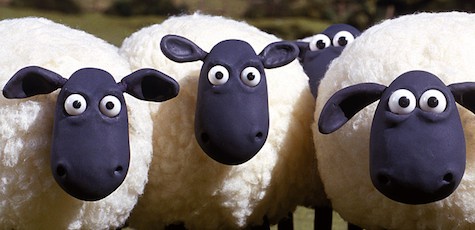I grew up watching horror movies. Just to give you an idea of what kind of time span we’re talking about, I’ll just say that while vampires were continuing their trend in becoming sexy blood-suckers, werewolves were still being portrayed as mindless, violent creatures who wanted to eat your face. So we’re talking the days of Silver Bullet, The Howling, and, of course (one my favorites), Monster Squad, which teaches us that Wolfman does indeed have “nards.”
I still love a good werewolf movie. The last decade has spawned some greats, like Dog Soldiers and Brotherhood of the Wolf, and I’m loving the variety. There’s more depth and breadth to the genre than some people think. They’re not all slaughter films. Some, like Ladyhawke, go with a different kind of werewolf all together, and involve a young Matthew Broderick climbing through a medieval sewer system. (Tell me that didn’t just sell you right there.)
There is one thing they all have in common, though. Wolves. I know what you’re thinking—well, duh, we’re talking about werewolf movies. The whole wolf thing is kind of implied. In books, though, we have more variety. I’ve encountered were-forms of hyenas, lions, foxes, bears, tigers, leopards, and coyotes in popular fiction. In my mythology books, I’ve even encountered were-dolphins, known as “encantado,” though technically they’re dolphins that turn into people rather than the other way around. But with the exception of the Swanmanes found in Laurell K. Hamilton’s books, they’ve all been predators. Which of course made me ask… why? Why do we need our creatures to magically transform into things that could easily make us into a midnight snack?
When my first book came out, I did an online chat thing, and since no one had read my book, it being release day and all, I posed my were-predatory question to the group. I was met with a resoundingly negative response. The general consensus was that it would be completely lame to have non-predator were-creatures. They couldn’t be scary or cool. Which naturally made me want to take the most cute and cuddly creature I could find and make it a were-something. So the book I’m working on now is full of werehares. Yup, killer bunnies.
Because here’s the thing—no matter what creature our characters turn into, they still start out as human. I’m not the first person to point out that humans are an apex predator, and you really can’t find any creature more bloodthirsty than we are. Even if you made a were-bush baby or a were-koala, they aren’t going to be gentle, passive creatures, because the human side would probably win out. Humans are at the top of the food chain because we’ll kill and eat almost anything. There are entire TV shows dedicated to the weird things we will kill and eat.
Now, I know what you’re thinking. “Well, they couldn’t make a movie out of killer bunnies or anything like that. You have to admit that, at least, would be lame.” The Monty Python boys and the creators of Night of the Lepus would disagree. (And I feel I should mention Wallace & Gromit: The Curse of the Were-Rabbit as well, even if that creature was only a danger to everyone’s prize-winning veg.) But okay, those aren’t actually therianthropes. (For those not into Googling, therianthropy is just the generic term for people shifting into the form of an animal.) But I have a trump card up my sleeve. It’s a film called Black Sheep. Black Sheep is set in New Zealand and its premise is, yup, you guessed it, killer were-sheep.
Killer. Were. Sheep.
Go ahead and take a moment to let that soak in.
The movie centers around Henry, a young man with a fear of sheep, returning to his family sheep farm both to face his fears and to sell his part of the farm to his brother. For Henry, it’s all about closure. Little does Henry know that his brother has been experimenting on the animals in order to create the perfect sheep. Naturally, it all goes horribly, fantastically, wrong.
We actually picked this movie up for a “bad movie night” at our house. Fifteen minutes in we all decided to buy a copy, because it’s just that awesome. The special effects are by WETA (Peter Jackson used them for Lord of the Rings, King Kong, and so on). Basically, if WETA is involved, you’re in for some extraordinary special effects and creature work. The script strikes that great note between horror and humor that I enjoy so much. How much did I enjoy this film? Well, my friend Denise made me a Black Sheep birthday cake one year. There were bloody animal crackers EVERYWHERE.
If this sounds like your cup of tea, I highly suggest that you check it out. Because really, we all need to be a little more open-minded. We need more diversity and more variety in the world, and that includes being open to new—slightly cuddly—therianthropes.
Lish McBride grew up in the Pacific Northwest and got her MFA in fiction from the University of New Orleans. Lish lives happily in Seattle with her family, two cats, and one very put-upon chihuahua. She is the author of Hold Me Closer, Necromancer and Necromancing the Stone, which publishes on September 18.










